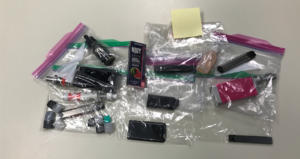On November 16, 2018, East Administration released a change to the discipline regarding e-cigarettes and vape pens.
The new punishment for a student who is caught vaping or with vape paraphernalia is now two days out of school suspension instead of one day in school suspension. If a student wishes to seek help for a vape/nicotine addiction they may approach any teacher, administrator, counselor, or the school nurse and they will receive resources at no penalty (unless they are caught with the paraphernalia).
Vaping has become a national epidemic and, across the United States, over 20% of high school and middle school students are addicted to nicotine and other vape products. These products were originally marketed to help regular cigarette users quit smoking, but has now seemingly replaced cigarettes for our generation.
Vape companies, many a sub-group to Big Tobacco, have switched its primary demographic to the under-eighteen age group. They use tactics like fun flavor and celebrity endorsements to put forth the idea that vaping is cool and less dangerous than smoking regular cigarettes. While in comparison to a cigarette, vape pens are less harmful, they pose no potential health benefit to those who have never smoked a normal cigarette before.
In fact, research has already revealed the negative side effects to vaping as just one Juul pod can contain as much nicotine as one entire carton cigarettes. Scientists have found chemicals within the vape juice that are carcinogenic (cancer-causing) such as cadmium, a heavy metal safe to ingest but not inhale. They have also found early evidence of popcorn lung, a disease from the flavoring, and bacteria in the lungs as a result of the water vapor.
The FDA has recently banned all flavored nicotine in stores, and have placed even further restrictions on Big Vape in response to the uptick of underage persons purchasing vape pens and products.
“Vaping is not just an East issue but rather a national issue and we must do our part in the education realm,” commented Principal Swatland.
Nicotine is an illegal drug for a person under the age of 18 to buy, and school grounds are drug-free. If a student were to be caught with marijuana, alcohol or related paraphernalia, the punishment would be an out of school suspension. The East Administration felt vape and nicotine products should now be regarded in the same way.
Many students felt that the change to out of school suspension was rash and that punishment should be dealt on a gradual basis, starting with a warning, moving to in-school suspension, and finally out of school suspension. However, East administration has commented that punishments will still remain on a gradual basis, but the starting point has changed. Students who are found vaping or with paraphernalia on their person will receive two days out of school suspension the first time, and that number will increase with every time they are caught.
“The goal of discipline is to educate and to change their behavior positively,” remarked Mr. Swatland. Students who are caught will also receive access to addiction resources.
Over the last few years, East has noticed an increase in students being caught with vape pens and products on their person, with the biggest issue being students failing to report their peers for vaping at school or at other school-sponsored events.
Students cite not wanting to be a snitch or feeling it isn’t their business to report a classmate. However, these students are having their day disrupted by their peers.
“I don’t even use the bathrooms anymore,” a sophomore complained.
Several students commented that they see classmates vaping in the locker rooms and buses to sporting events. Yet, students don’t relay this information to teachers or even administration.
“It’s the student’s school too, they have to be the one to report it if they want to see change, the same thing goes for vaping as it does for bullying,” said Principal Swatland.
There are only three administrators, and they often are the ones being tasked to catch students in the act. Mr. Swatland, Ms. DeSantis, and Mr. Grey have been making an effort to check the bathrooms more often, patrol the hallways, and be visible enough that students feel comfortable approaching them about a classmate or their own addiction problem.
According to Juul’s website, each pod has the nicotine equivalent of 20 cigarettes, which many are linking to later nicotine addiction and alcohol dependency. Students must voluntarily report their addiction to any staff member in order to receive no penalty. These students are given access to resources and ways to break the physical and habitual addiction of nicotine. The physical side-effects typically last for three days but the mental symptoms can last up to three months. However, nicotine addiction is treatable, and there is a proven success rate of those who try to quit, especially younger addicts.
Some students have come forward and utilized the no-penalty in exchange for receiving help from counselors and other staff members.
Many freshmen commented that the vaping epidemic didn’t start at East, but rather it was brought up from Transit Middle, with kids beginning to vape as young as seventh grade. Mr. Swatland and the East Administration has plans to work with Transit Middle and their administration to stem the upbringing of vape into East.
The hopeful goal of the policy is to end the epidemic, but realistically all East can hope for is that those who are addicted will receive the proper help they need and that, at least on school grounds, this will be a thing of the past.

